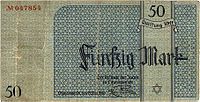Chaim Rumkowski
Chaim Mordechaj Rumkowski (February 27, 1877 – August 28, 1944) was the head of the Jewish Council of Elders in the Łódź Ghetto appointed by Nazi Germany during the German occupation of Poland.
Rumkowski accrued much power by transforming the ghetto into an industrial base manufacturing war supplies for the Wehrmacht in the mistaken belief that productivity was the key to Jewish survival beyond the Holocaust.
[2][3] Chaim Rumkowski was born on February 27, 1877, to Jewish parents in Ilyino, a shtetl in Vitebsk Governorate, Russian Empire.
[5] Before the German invasion of Poland, Rumkowski was an insurance agent in Łódź, a member of Qahal, and the head of a Jewish orphanage at 15 Krajowa Street between 1925 and 1939.
[6] Łódź was annexed by the invading Germans into Nazi Germany and became part of the territory of new Reichsgau Wartheland, separate from the Generalgouvernement established in most of the German-occupied Poland.
The occupation authority ordered the creation of the new Jewish Councils known as the Judenräte which acted as bridges between the Nazis and the prisoner population of the ghettos.
In addition to managing basic services such as communal kitchens, infirmaries, post offices and vocational schools, common tasks of the Judenräte included providing the Nazi regime with slave labor, and rounding up quotas of Jews for "resettlement in the East," a euphemism for deportations to extermination camps in the deadliest phase of the Holocaust.
Although Rumkowski and other "Jewish elders" of the Nazi era came to be regarded as collaborators and traitors, historians have reassessed this judgment since the late 20th century in light of the terrible conditions of the time.
Rumkowski believed that smuggling of food would "destabilize the ghetto with regard to the prices of basic commodities" and prevented it from taking place.
"[22] This sort of "optimism" however, was met with a damning assessment by Max Horn from Ostindustrie, who said that the ghetto was badly managed, not profitable, and had the wrong products.
[25] On German orders Rumkowski delivered a speech on September 4, 1942, pleading with the Jews in the ghetto to give up children 10 years of age and younger, as well as the elderly over 65, so that others might survive.
"Horrible, terrifying wailing among the assembled crowd" could be heard, reads the transcriber's note to his parlance often referred to as: "Give Me Your Children".
Rumkowski was ruthless, using his position as head of the Judenrat to confiscate property and businesses that were still being run by their rightful Jewish owners in the ghetto.
He established numerous departments and institutions that dealt with all of the ghetto's internal affairs, from housing tens of thousands of people, to distributing food rations.
For example, since the Germans disbanded the rabbinate in September 1942, Rumkowski began conducting wedding ceremonies, and altering the marriage contract (ketubah).
[31] Due to Rumkowski's harsh treatment, and stern, arrogant personality, the Jews began to blame him for their predicament, and unleashed their frustration on him instead of the Germans, who were beyond their reach.
Led by activists and leftist parties against Rumkowski, the workers abandoned their stations and went to the streets handing out fliers: Brothers and sisters!
Turn out en masse to wipe out at long last, with joint and unified force, the terrible poverty and the barbaric behaviour of the Kehilla representatives toward the wretched, exhausted, starved public...
Let's join forces in war against the accursed Kehilla parasite... – Demonstration Leaflet [33]There are conflicting accounts regarding Rumkowski's final moments.
Toward his fellow Jews, he was an incomparable tyrant who behaved just like a Führer and cast deathly terror to anyone who dared to oppose his lowly ways.
"[2] Historian Michal Unger, in her Reassessment of the Image of Mordechai Chaim Rumkowski (2004) explored the materials leading to his reputation.
Rumkowski is described "on the one hand, an aggressive, domineering person, thirsty for honor and power, raucous, vulgar and ignorant, impatient (and) intolerant, impulsive and lustful.
"[35] Research performed by Isaiah Trunk for the book Judenrat attempted to revise the prevailing view of Rumkowski as traitor and collaborationist.
But there are extenuating circumstances: an infernal order such as National Socialism exercises a frightful power of corruption against which it is difficult to guard oneself.
Hannah Arendt, in her book Eichmann in Jerusalem, placed Rumkowski's egotism at the low end of the spectrum of wartime ghetto leadership examples.
[40] Professor Yehuda Bauer points out that if the Russians had continued their summer offensive in 1944, Lodz would have been the only ghetto to be liberated with a significant number of its inhabitants still alive, and Rumkowski might be remembered in a very different light.



